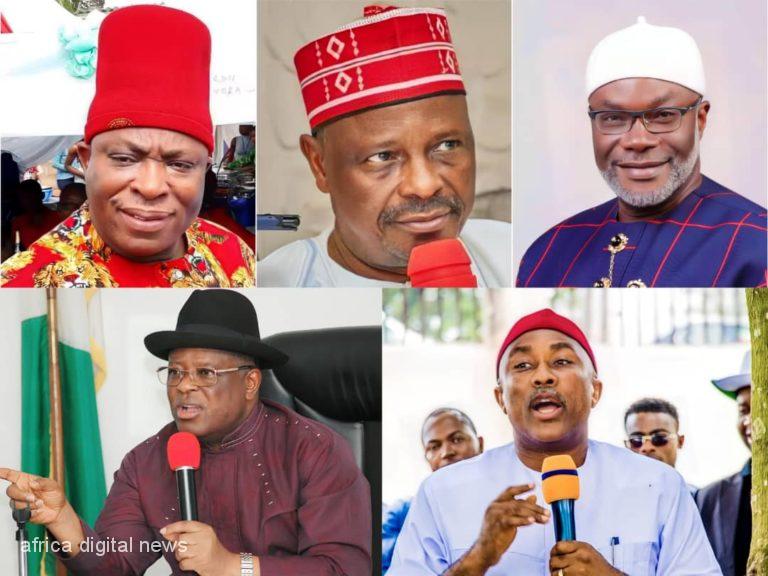Over the years, politics in Nigeria has become an old-school game – a game that allows politicians to recycle and align themselves at every turn in election cycles. These alignments have, sadly, remained based on self and group interests and not National interests, while Nigerians and Nigeria have remained the biggest losers in all of these shenanigans.
It is well-known that politics in Nigeria has been one bereft of ideology, system, and mindset. Nigerian politicians who have mastered the art of deceit and fraud have continuously played on the intelligence of gullible Nigerians without consequences. To them, it is just a game that they play with the same tactics every election year. Most of these politicians have been around for quite some time and they have refused to give way. Every now and then, they sell themselves in new bottles, rebranding themselves as Messiahs despite the fact that they are key players in the existing rot.
Partisan politics was birthed in the Nigerian political space in the second decade of the twentieth century. Since then, different sets and classes of politicians have manifested varying degrees of madness, shamelessness, and debased versions of this very Machiavellian approach to politics in their lust for political power.
Despite their shortcomings, most of the leading politicians in that era, especially those that played the political game shortly after Nigeria’s independence actually played it with some considerable gumption and commitment to the interests of their people and how to make their people the focal point of their political struggles.
Read Also: 2023 Presidential Election: APC Has Already Rigged It
This explains why when one goes to the Eastern part of Nigeria today, the people from the region still remember Dr. Michael Okpara with some nostalgia. Same thing goes for people from the West who revere Chief Obafemi Awolowo and popularly regard him as the greatest politician to emerge from the descendants of Oduduwa. The North is not left out, Mallam Aminu Kano and Sir Ahmadu Bello are today still role models for virtually everyone there for many reasons. The big question is, do we still have these kinds of politicians in today’s Nigeria? The answer is a big No.
Over the last four decades, Nigeria’s politics and leadership have continued to deteriorate so badly, leaving one to wonder what exactly is wrong.
Today, the leadership quotient and the moral quality of politicians who have continued to contest for, and hold leadership positions in Nigeria have dropped considerably, and the worst is yet to come.
The system of politics practiced in Nigeria today is now such that detestable scoundrels, certificate forgers, fraudsters, people with dubious antecedents and questionable character and all kinds of undesirable elements have taken the centre stage and they are now calling the shots. How shameful!
Many people have blamed the military for the drop in leadership quality in Nigeria. While this may be right, the truth is that even civilians have not fared any better. With the return of power to civilians in 1999, civilians simply took power and unleashed a barrage of shamelessness on the psyche of Nigerians. These kinds of politicians and brand of politics have left Nigeria stunted. The problems have remained the same for decades – corruption, poor living standards, institutional failure, decaying infrastructure, nepotism, and what have you.
Rather than addressing these problems, Nigerian politicians have simply continued to change political parties like worn-out uniforms every now and then, while deceiving Nigerians about their commitment to solving them.
Cross-carpeting between parties has, over the years, become so brazen that Nigerian politicians no longer have second thoughts about it. Cross-carpeting to the next available party is almost impulsive today and Nigerians are beginning to get used to it, probably because all the political parties in Nigeria today are essentially ideologically barren and morally bankrupt.
Before every election, they simply throw very colourful manifestoes which are mere pieces of paper with no meaning to them at Nigerians and expect them to buy the contents hook, line, and sinker.
Many Nigerians who have been able to see through these politicians now associate them with lying, betrayal, kleptomania, deception, and megalomania, and they are not wrong. One of the biggest tasks in the country today is to find a trustworthy politician, and this has created a huge problem that will require at least a century to solve.
In the build-up to the 2023 general election, Nigerian politicians such as Peter Obi, Rabiu Musa Kwankwaso, Senator Ezenwa Onyewuchi, Uche Onyeagocha, Victor Umeh, David Umahi, Daniel Bwala, and many others have all moved from their previous political parties and are now recanting everything they said just months ago!
There is a huge moral question that has not been answered by these politicians and they don’t even care.
A politician in the South-East, a few years ago described politics as another business franchise. His party man from the North-Central who is a former Governor of Niger State, Aliyu Babangida, enhanced on that transactional description when he said in January 2015, that, ‘Politics is not about morality. If you’re talking about politics or morals, go and become an Imam or a pastor.’ This actually mirrors the average Nigerian politician. For them, it is about their interests which are most of the time plainly selfish.
In conclusion, while the madness continues and politicians take turns to brutally rape and loot the resources of Nigeria, the Nigerian people who, in this case, are the biggest losers, must understand that these absurdities are happening because these heartless politicians know that they are just too docile to react and demand better terms.
Nigerians, particularly young people must acquaint themselves with the fact that their silence is the reason politicians mistake them for fools and treat them without any iota of respect or transparency.
Nigerians must understand that there is no better time to spring into action than now. The time to end this game of recycling the recycled must end with the next election.










